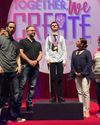This time for Africa
Certification Magazine
|April 2020
Georgia educator spearheads effort to get computers to Tanzania

In the United States, we have the good fortune of referring to all members of the current generation of students as digital natives. We can be fairly confident that at some point in elementary school every student turned on a computer. That every student has written a paragraph using a word processing program or at least created a slide presentation on a home or school computer. That the majority of homes have a computer, and that most students have a cell phone.
We have many debates in the United States over the digital divide. For some, the issue is the level of technology access in the home, at work, or in the classroom. (Note that we’re only arguing about the degree of access; we take for granted that everyone uses technology on some level.) Others may concern themselves with the availability of reliable internet access.
We have a strong vision of a digital future shaped by 21st-century skills and artificial intelligence. While there will be jobs specific to AI, such as engineering and programming, most of the future jobs will be like the ones we have today, including infrastructure support such as hardware, networking, and security. Either way, we don’t worry about having access to training for those jobs.
For most of us, the more relevant digital divide is between those who understand the technology and those who use it. Everyone has used a computer at school or work, everyone knows how to create a document or draw up a spreadsheet. We have the freedom to think in the abstract about technology: How much do we understand the technologies we use? How do we relate to them?
I come from a land of plenty
As an instructor in the information technology field here in the United States, I have been fortunate even by the elevated standards of IT access in America. I teach information technology in the Grayson Technical Education Program at Grayson High School in Gwinnett County, Georgia.
Esta historia es de la edición April 2020 de Certification Magazine.
Suscríbete a Magzter GOLD para acceder a miles de historias premium seleccionadas y a más de 9000 revistas y periódicos.
¿Ya eres suscriptor? Iniciar sesión
MÁS HISTORIAS DE Certification Magazine

Certification Magazine
Wanted: Your Cloud Computing Skills
Employers need cloud computing expertise, but demand is outstripping supply
6 mins
October 2020

Certification Magazine
The Job Before Your First Job
An IT internship can be your strong first step toward a rewarding professional career
10 mins
October 2020

Certification Magazine
Professionalizing the CLOUD
A conversation with the exam architect behind the hottest certification in cloud security
7 mins
October 2020

Certification Magazine
SETTING HIS SIGHTS ON SUCCESS
Ohio IT student has mastered computer repair, cybersecurity, and certification
10 mins
October 2020

Certification Magazine
The Typist Who Became a Technologist
Long time Utah IT educator got her first exposure to computers in high school
11 mins
October 2020

Certification Magazine
Pick a Cloud, Any Cloud
Which cloud computing models best support business aims — and which ones should you learn?
7 mins
October 2020

Certification Magazine
Here, There, and Everywhere
Distributed cloud computing is bringing the cloud closer to all of us
7 mins
October 2020

Certification Magazine
Master of Efficiency
A skilled operations analyst fine tunes processes to help organizations flourish
6 mins
October 2020

Certification Magazine
Learn Smarter, Not Harder
Everyone is doing online learning now — but that doesn’t mean they’re doing it right
10 mins
October 2020

Certification Magazine
From Horizon to Horizon
No matter where you look, cloud technology is blanketing the IT industry
9 mins
October 2020
Translate
Change font size

